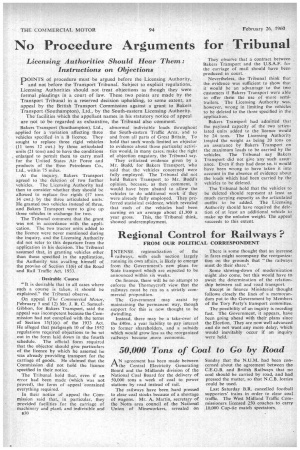No Procedure Arguments for Tribunal
Page 144

If you've noticed an error in this article please click here to report it so we can fix it.
Licensing Authorities Should Hear Them : Instructions on Objections
POINTS of procedure must be argued before the Licensing Authority, and not before the Transport Tribunal. Subject to explicit regulations, Licensing Authorities should not treat objections as though they were
formal pleadings in a court of law. These two points are made by the Transport Tribunal in a reserved decision upholding, to some extent, an appeal by the British Transport Commission against a grant to Bakers Transport (Southampton), Ltd., by the South-eastern Licensing Authority. The facilities Which the appellant names in his statutory notice of appeal are not to be regarded as exhaustive, the Tribunal also comment.
Bakers Transport (Southampton), Ltd., applied for a variation affecting three vehicles specified in a B licence. They sought to replace three rigid vehicles (11 tons 12 cwt.) by three articulated units (21 tons) and to have the conditions enlarged to permit them to carry mail for the United States Air Force and products of the Esso Petroleum Co., Ltd., within 75 miles.
At the inquiry, Bakers Transport agreed to the deletion of two further vehicles. The Licensing Authority had then to consider whether they should be allowed to replace five rigids (17 tons 14 cwt.) by the three articulated units.He granted two vehicles instead of three, and Bakers Transport were to give up three vehicles in exchange for two.
The Tribunal comment that the grant was not in accordance with the application. The two tractor units added to the licence were never mentioned during the inquiry, and the Licensing Authority did not refer to this departure from the application in his decision. The Tribunal assumed that, in granting vehicles other than those specified in the application, the Authority was availing himself of the proviso of Section 11(6) of the Road and Rail Traffic Act, 1933.
/Desirable Course It is desirable that in all cases where such a course is taken, it should be explained," the Tribunal observe.
On appeal (The Commercial Motor, February 5 and 12) Mr. J. R. C. SamuelGibbon, for Bakers Transport, said the appeal was incompetent because the Commission had not complied with the terms of Section 15(1)(c) of the 1933 Act. He alleged that parlagraph 10 of the 1952 regulations required objections to be set out in the form laid down in the fourth
schedule. The official form required that the objector should give particulars of the licence by which he asserted he was already providing transport for the carriage of goods. He claimed that the Commission did not hold the licence specified in their notice.
The Tribunal bold that, even if an error had been made (which was not proved), the form of appeal 'contained everything required. .
In their notice of appeal the Commission said that,, in particular, they provided facilities for the carriage of machinery and plant: and indivisible and
n30 abnormal indivisible loads throughout the South-eastern Traffic Area, and to and from all parts of Great Britain. To hold that such words limited an objector to evidence about those particular activities would, in many cases, make the right of objection nugatory, the Tribunal say.
They criticized evidence given by a Mr. Budd, for Bakers Transport, who said that the vehicles concerned were fully employed. The Tribunal did not hold Bakers Transport, to Mr. Budd's opinion, because, as they comment, it would have been absurd to allow the vehicles to do additional work if they were already fully employed. They preferred statistical evidence, which revealed that each of the vehicles had been earning on an average about £1,300 a year gross. This, the Tribunal think, showed underemployment. They observe that a contract between Bakers Transport and the U.S.A.F. for the carriage of mail should have been produced in court.
Nevertheless, the Tribunal think that the evidence was sufficient to show that it would be an advantage to the two customers if Bakers Transport were able to offer them the use of -more semitrailers. The Licensing Authority was, however, wrong in limiting the vehicles to be deleted to the three specified in the a pplication.
Bakers Transport had admitted that the payload capacity of the two articulated units added to the licence would be 24 tons, The Licensing Authority treated the weight as being 20 tons on an assurance by Bakers Transport on the maximum loads to be carried by the vehicles. The Tribunal say Bakers Transport did not give any such assurance. Even if they had done so, it would have been wrong to have taken it into account in the absence of evidence about the loads which had been carried by the . vehicles to be deleted.
The Tribunal hold that the vehicles to be deleted should represent at least as much carrying capacity as the articulated outfits to be added. The Licensing Authority should have required the deletion of at least art additional vehicle to make up the unladen weight. The appeal succeeds to this extent.
























































































































































































































